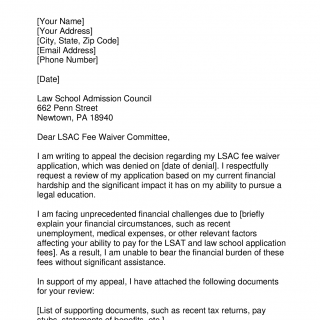LSAC Fee Waiver Appeal Letter
A LSAC fee waiver appeal letter is a crucial written document used by law school applicants to contest a decision made by the Law School Admission Council (LSAC) regarding their fee waiver application. The primary purpose of this letter is to request a review of the fee waiver decision by providing compelling reasons for reconsideration.
Components and Importance:
- Introduction: Clearly state the appeal for the fee waiver decision and provide a brief overview of the reasons for appeal.
- Reasons for Appeal: Detail the circumstances that justify the need for financial assistance, such as financial hardship, unemployment, or other relevant factors.
- Supporting Evidence: Attach necessary documentation such as tax returns, proof of income, or any other documents supporting your appeal.
- Compelling Argument: Present a strong case for why the fee waiver should be granted, highlighting the impact on your ability to pursue a legal education.
- Conclusion: Restate your request for reconsideration and express gratitude for the opportunity to appeal.
Data and Documents Required:
- Personal Information: Name, LSAC account number, contact details.
- Explanation of Financial Hardship: Details on income, dependents, expenses.
- Supporting Documents: Tax returns, pay stubs, unemployment benefits statement.
The LSAC fee waiver appeal letter can be submitted electronically through the applicant's LSAC account or via email to the designated LSAC contact. It is important to keep a copy of the letter for your records and to track the status of the appeal.
Sample of LSAC Fee Waiver Appeal Letter
[Your Name][Your Address][City, State, Zip Code][Email Address][Phone Number][Date]Law School Admission Council662 Penn StreetNewtown, PA 18940Dear LSAC Fee Waiver Committee,I am writing to appeal the decision regarding my LSAC fee waiver application, which was denied on [date of denial]. I respectfully request a review of my application based on my current financial hardship and the significant impact it has on my ability to pursue a legal education.I am facing unprecedented financial challenges due to [briefly explain your financial circumstances, such as recent unemployment, medical expenses, or other relevant factors affecting your ability to pay for the LSAT and law school application fees]. As a result, I am unable to bear the financial burden of these fees without significant assistance.In support of my appeal, I have attached the following documents for your review:[List of supporting documents, such as recent tax returns, pay stubs, statements of benefits, etc.]I believe that granting me a fee waiver for the LSAT and law school application fees would not only alleviate my financial hardship but also enable me to pursue my dream of attending law school and contributing positively to the legal profession.I kindly ask the fee waiver committee to reconsider my application and provide the financial assistance that I need to move forward with my legal education journey.Thank you for your time and consideration. I look forward to a positive resolution to this appeal.Sincerely,[Your Name]
Practice and Use Cases:
- Strengths: Provides an opportunity to present a more detailed case for financial assistance.
- Weaknesses: May require sensitive financial information to be shared.
- Opportunities: Can result in a positive outcome and alleviate financial burden on the applicant.
- Threats: Rejection of the appeal may lead to added financial stress on the applicant.
A successful fee waiver appeal can significantly impact the applicant's financial situation by easing the financial strain of LSAT and law school application fees, ultimately paving the way for pursuing a legal education.
Alternative Forms: Financial aid applications, scholarship appeals.
In conclusion, the LSAC fee waiver appeal letter plays a crucial role in the application process for aspiring law students seeking financial assistance. By crafting a well-written and compelling appeal, applicants can potentially secure the needed support to pursue their legal education dreams.

